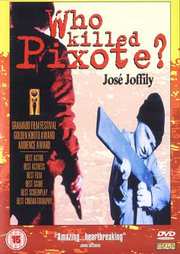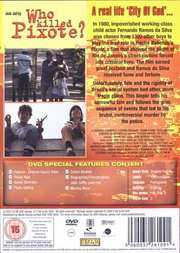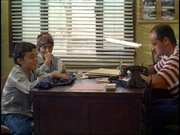Review of Who Killed Pixote?
Introduction
This is a `biopic` about Fernando Ramos Da Silva who gained worldwide recognition at the age of 11. He was a child star in Hector Babenco`s 1980 film "Pixote, Law of the Strongest." A child from the San Paolo favela Diadema, Da Silva naturally believed his life would be changed forever. Having improved the status and standing of his whole family, they thought the good-life would continue forever. However, the scarcity of roles and his near illiteracy prevented him from developing an acting career.
Unlike the glut of cheesy `made for TV` biopics to come out of the US, this South American take is a much more worthy affair, directed and performed with great sensitivity. It`s a tragic and moral tale that is all the more poignant for being a relatively accurate portrayal of life truly imitating art. The tragedy of the real `Pixote` was that, after featuring in a film about the plight of street kids in slum-land San Paolo (where the rich may be rich but the poor are very poor), his own life became tainted by similar tragedy - culminating in his untimely demise at a tender age. The death shocked the nation and his tale was recounted in Pixote, Law of the Strongest by Brazilian journalist Loureiro and Pixote No More by Cida Venancio Da Silva, Da Silva`s young widow. This biopic`s narrative is based primarily on these two sources.
The tragedy of this story is similar to that of many child stars. After initial success the changes brought on by physical maturity meant that the roles quickly dried up. This is bad enough in countries where economic support is available for those unable to work, but this continuing bad luck precipitates Da Silva`s tragic downfall in a country where the poor are often left to their own limited resources. It`s common and scandalous knowledge that Da Silva was brutally murdered by the Brazilian police following a descent into crime, a mere 7 years after the original `Pixote` was released to such international acclaim.
Da Silva, played convincingly by Cassiano Carneiro, is seen here as a boy with great sensitivity, plucked form obscurity by a casting agent and propelled into national fame with the success of the movie, `Pixote, law of the strongest`. The biopic has a documentary feel about it and the dialogue is natural. It`s not easy viewing and the inevitability of the tragic downfall of it`s principal is all pervading. As a social commentary it`s a scathing attack on Brazil and it`s policy of `no policy` with regards to it`s many under-privileged and it`s non-policed policing too.
Not recommended for a cosy Sunday afternoon`s viewing, but a refreshingly alternative take to the `biopic` than we`re used to from Hollywood`s mainstream. It`s a movie with a mission.

Video
C`est La Vie`s raft of recent releases have been wildly variable in quality. This particular transfer is entirely acceptable, though certainly not without the occasional blemish. Thankfully presented here in its original aspect ratio.

Audio
The audio here is fine, and dialogue (though sparing) is clear for those able to understand Portuguese. The choice of music dates the film beyond its years but this is probably a stylistic trait of Brazilian film-making of the period.

Features
The features are proudly listed on the box but frankly amount to very little. There`s the C`est La Vie Trailers, a photo gallery, and text based filmography / biography for Director Jose Joffily.

Conclusion
This non-Hollywood take on the `biopic` genre is serious stuff. It`s a grim recounting of the life of Fernando Ramos Da Silva, the young street urchin catapulted to fame in 1980 playing the part of one of Brazil`s many street urchins or `Pixotes`. A street-urchin himself, the fame brought good fortune to Fernando and his family though the roles dried up, along with the money and, in a grim version of life imitating art, his own life descended into crime and poverty, culminating in his brutal death at the hands of the Brazilian police. It shocked the nation. This Brazilian biopic re-tells the story in a non-judgemental, almost documentary fashion. It`s a well-made, well-performed piece, though is certainly not fun viewing.

















































Your Opinions and Comments
Be the first to post a comment!